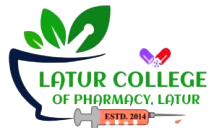Departments
Pharmaceutics
Pharmaceutics is the discipline of pharmacy that deals with the process of turning a new chemical entity (NCE) or old drugs into a medication to be used safely and effectively by patients. It is also called the science of dosage form design. There are many chemicals with pharmacological properties but need special measures to help them achieve therapeutically relevant amounts at their sites of action. Pharmaceutics helps relate the formulation of drugs to their delivery and disposition in the body. Pharmaceutics deals with the formulation of a pure drug substance into a dosage form. Branches of pharmaceutics include:
-
- Pharmaceutical formulation
- Pharmaceutical manufacturing
- Dispensing pharmacy
- Pharmaceutical technology
- Physical Pharmacy
- Pharmaceutical jurisprudence
Pharma Chemistry
The mission of the Pharmaceutical Chemistry course is to introduce students to the structure, properties, and analysis of pharmaceutical agents and metabolites as well as some fundamental techniques used for near-patient testing and pharmacokinetic analysis. Pharmaceutical chemistry leads to careers in drug development, biotechnology, pharmaceutical companies, research facilities, and more. Studying pharmaceutical chemistry allows students to contribute to life-saving remedies, enhance the speed of delivery of new medications, and help others. This is a multi-disciplinary field of study that utilizes synthetic organic chemistry in conjunction with developments in biochemistry, computational chemistry, molecular biology, and pharmacology to advance drug discovery. Branches of pharma chemistry include
-
- Analytical Chemistry
- Biological/Biochemistry
- Chemical Engineering
- Inorganic Chemistry
- Organic Chemistry
- Physical Chemistry
Pharmacognosy
A medicinal plant garden on the campus is available to cater to the need of the pharmacognosy lab. This is the place where the students study the aspects of natural drugs. The lab is equipped for the identification, and isolation of phytopharmaceuticals, and macro, microscopic, physical & chemical characterization of natural drugs. Pharmacognosy, defined as the study of the physical, chemical, biochemical, and biological properties of drugs or potential drugs or drug substances of natural origin as well as the search for new drugs from natural sources is a specialized area of applied science that deals with natural products that affect the health of humans and animals. This Lab consists of organized as well as unorganized crude drugs. The lab provides esteemed guidelines to the students regarding the natural sources of drugs and phytochemical screening through various instruments. The laboratory is utilized for morphological and anatomy study of drugs of natural origin. The lab is associated with a museum in which herbal drugs are displayed. An herbarium is also maintained in the lab for the identification of medicinal plants. We assist regional people in the identification of medicinal plants by providing important morphological features of original medicinal plants located in the herbarium museum.
Pharmacology
The laboratory provides the student with basic methodologies used to evaluate how drugs modify physiological functions, through interactions with specific receptors at distinct sites. It gives a hands-on experience to measure and calculate several important parameters most often discussed and described in pharmacology literature such as KD, Bmax, Ki, EC50, IC50 Emax, pD2, and pA2 values for various drugs and the rationale behind the competitive and non-competitive type of pharmacological antagonism.
Pharmacy Practice
This lab used to provide students with a basic knowledge of the biology and growth of microorganisms, an understanding of microbial disease pathogenesis and transmission, an appreciation for microorganisms in our environment and complex interactions between microbes and humans, an awareness of current issues in biotechnology, medical microbiology, and infectious disease, an ability to perform common microbiological laboratory procedures and a familiarity with recent advances in research. This lab is also utilized for plant tissue culture and to study the antibacterial activity of organic medicinal compounds. The social pharmacy may be defined as a discipline dealing with the role of medicines from social, scientific, and humanistic perspectives. It draws on theories of social and behavioral sciences including health psychology. Social pharmacy as a social science within the health care and pharmacy may provide various views on issues managed by health professionals inside as well as outside of the health care system. This multidisciplinary perspective often offers divergent opinions which could be sometimes considered contradictory with conflicting solutions.

